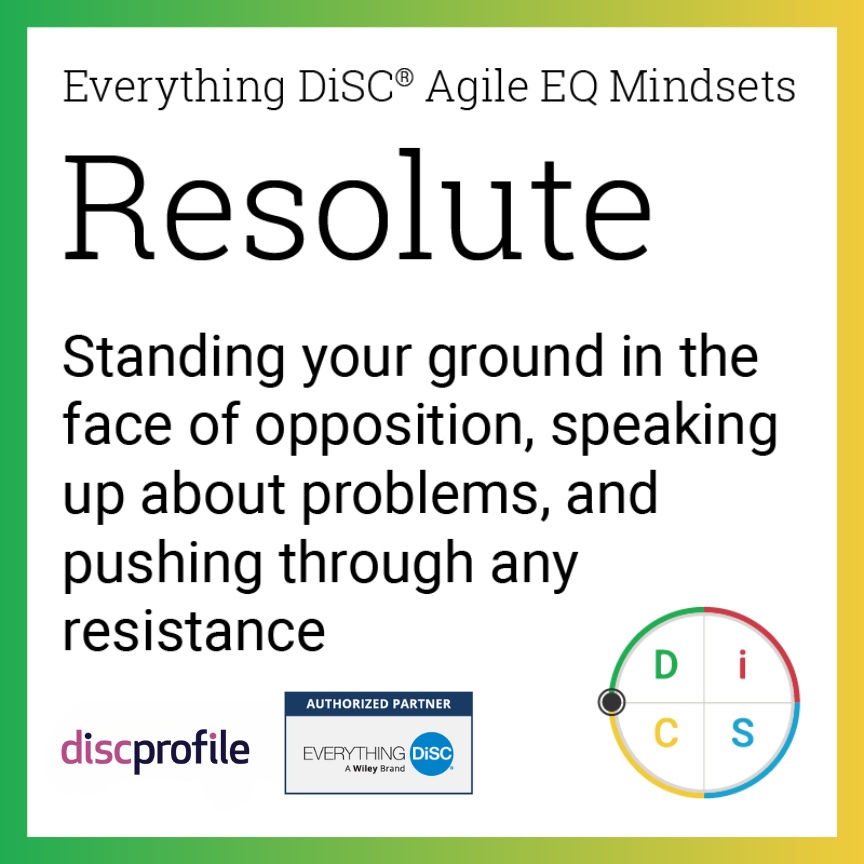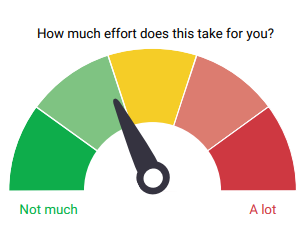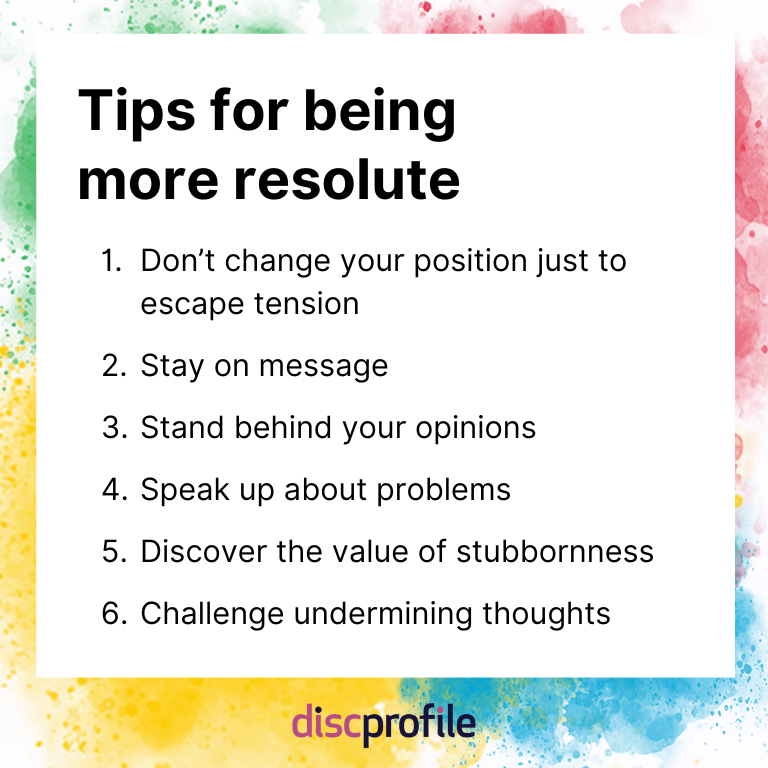How to Be More Resolute

Key Takeaways
- People with resolute personalities push through resistance and stand their ground.
- People of all personality types may want to call upon the resolute mindset when they need to protect their time, resist the influence of others, or defend their ideas.
- You can practice showing resolve by being OK with disagreement and discomfort, discovering the value of stubbornness, and staying on message, among other tips.
In any given situation, we have many options for approaching it. We don't always realize this, because we react first from our natural tendencies. Sometimes those instincts are a good fit for the situation at hand. At other times, adopting a different mindset may be more appropriate.
Learning about and gaining comfort in a variety of mindsets allows you to expand your emotional intelligence (EQ). You can navigate your day with more emotional agility, rather than reacting to situations only with your first instinct.
Resolute definition
“I stand by my beliefs.”
Resolute people project confidence and speak up about problems. They don’t give in when pushed toward something that doesn’t sit right. It’s (usually) not about getting their way for the sake of getting their way. Instead, it’s about believing in themselves and not caving just because someone else is louder.
Source: Everything DiSC® Agile EQ™
Resolute people believe it’s their responsibility to communicate their ideas clearly so people know where they’re coming from. They realize a bit of tension and disagreement is OK, or even good. Their comfort is less important than doing justice to their ideas.
People with resolute dispositions tend to have high standards and push back against flawed reasoning. They are willing to tackle obstacles that might hold others back, moving forward to accomplish their goals. They have the ability to view a setback as an opportunity, while others might deflate.
Resolute is one of the eight mindsets described in Everything DiSC Agile EQ , and tends to align with DiSC CD and DC styles.
Why are some people more resolute?
The mindsets that we reach for most often are the ones that support our deepest social and emotional needs. The actions and dispositions of resolute people feel natural to them because resolve helps them meet needs like:
- competence
- independence
- influence
- control
- meeting high standards
- making progress
Benefits of a resolute mindset
All teams need someone who will get things done and get them done right. Whether or not the resolute mindset is one that comes naturally to you, calling upon this mindset helps you:
- stand up for your beliefs
- advocate for your needs
- persist through challenges that might otherwise threaten your goals
- maintain confidence in your perspective, even when others cast doubt
- speak up when there’s a problem, even if it causes discomfort
- project a confidence that gives courage to others
- refuse to settle when you know something can be better
- keep a project moving forward, even when there is ambiguity
Calling upon the resolute mindset when appropriate has benefits for people of different DiSC styles.
If you have an i style or S style, you may be tempted to yield to others in tense situations. You do this even if you know you’re right, or you feel strongly about an issue. Your instincts are telling you that backing down will help maintain relationships or restore harmony.
But your views matter as much as anyone else’s. You owe it to your ideas and beliefs to speak up, even if it is uncomfortable for you.
Being resolute when it is needed doesn’t just benefit you, but your team as well. Doing so can:
- prevent small issues from ballooning into something bigger
- help stave off the resentment of the unheard
- ensure things get done the right way
- contribute to healthy team dynamics and balanced power
In addition, projecting confidence and clarity is a gift you can give anxious coworkers in high-stress times.

Situations that may call for being more resolute
Say you are a naturally receptive person who is pitching a new idea to your team. You’ve done your research and know it’s a good idea. However, when you bring it up, your colleagues start brainstorming their own, different ideas.
You might need to adapt to how the situation is progressing by choosing the resolute mindset. From this mindset, you can still agree that other viewpoints are important. But you’ll be better able to stay on message and advocate for your idea.
You may need to show resolve when:
- defending your ideas
- protecting your time
- standing up to strong personalities
- initiating critical feedback
- resisting the influence of others
- preventing small issues from ballooning
- pushing toward the finish line
- fighting for change, especially when you’re in the minority
Limitations of a resolute personality
We all rely too much on our first instinct, rather than choosing the best attitude for each situation. If you get stuck in the resolute mindset, you might:
- become overly stubborn or competitive
- dig your heels in to retain power
- refuse to back down out of a desire to be right or to “win”
- become so inflexible that you alienate colleagues or cause them to shut down
- fail to consider facts or opinions that contradict your own
- project dissatisfaction
- miss out on a better opportunity or approach because you’re so intent on holding your ground
- focus so much on your goal that you close yourself off to warning signs when something is wrong
Understand why you may lack resolve
Being a more resolute person can be a challenge for different reasons for the various DiSC styles. So, the approach for growing this competency should be different as well. Each Agile EQ report (see sample) is heavily personalized based on a person’s DiSC style and their effort meter for each mindset.
Some S styles, for example, may not need a lot of energy to stretch into the resolute mindset. (In other words, their effort meter is green in their Agile EQ profile.) But for others with the same placement on the DiSC model, it may take a great deal of effort. Agile EQ has customized goals and action steps for each learner.

Recognize your thoughts
Becoming more resolute starts with identifying and overcoming thoughts like:
- I don’t want to appear rude or selfish.
- If I give in, things can go back to normal.
- I’m not going to fight this because I want to be a team player.
- It’s not worth delaying things to address this.
- I’m sure this will work out fine.
- It’s not worth rocking the boat.
Set goals
The next step is to set goals. These may be things like:
- I stand behind my opinions, even if others disagree.
- When appropriate, I know how to be stubborn without threatening my relationships.
- I’m fairly willing to say no to extra tasks when my to-do list is full.
- In most meetings, I tend to believe I’m as capable as anyone else there.
6 tips for becoming more resolute
Like any skill, resolve gets easier with practice. Some general tips for being more resolute are to gain comfort with disagreement and tension, stay on message, and challenge thoughts undermining your confidence.
1. Don’t change your position just to escape tension
You may end up changing your position for other reasons, but if you are doing it just to ease tension, take a second to reconsider. Disagreement—and even conflict—is healthy in the workplace when done productively. However, many people experience significant psychological discomfort when faced with interpersonal conflict. This leads them to compromise prematurely or abandon their stance altogether.
Discomfort doesn’t mean you’re wrong—it may mean you’re pushing into new territory. When you change your mind just to avoid conflict, you do a disservice to your team. Groups overvaluing harmony often resort to groupthink, where decision-making values harmony or conformity over critical thinking.
Yale University research psychologist Irving Janis outlined the eight symptoms of groupthink, one of which is self-censorship. When you stay silent or change your position for the sake of group harmony, you’re depriving the team of the opportunity for full analysis of the options. While deferring might feel safe in the moment, it can hinder innovation and lead to poor decision outcomes.
You can be open-minded and receptive to others’ ideas without being overly accommodating. Growth-oriented people are willing to change their minds, but the shift stems from reflection, not reactivity.
2. Stay on message
Consistency is one of the most powerful traits of resolute leaders. When you stay on message, you project confidence and trustworthiness, making it easier for others to align with your perspective. Inconsistency—even if unintentional—can breed confusion or skepticism among teams.
Staying on message doesn’t mean being inflexible. It just means you’re not constantly reinventing your stance to please others or chase approval. You know what you’re about, and you keep returning to it—even when the noise around you gets loud.
You can be more resolute by steering conversations back to important topics. Helping those around you stay focused is especially useful when you’re pushing a project to the finish line.
3. Stand behind your opinions, even the unpopular ones
Taking a stand, especially for unpopular ideas, is one of the truest tests of resolve.
You might not think of yourself as a courageous person. Jim Detert, author of Choosing Courage: The Everyday Guide to Being Brave at Work, writes that because courage is often tied to heroic acts in headlines, many of us believe courage is a rare quality reserved for the few. In fact, his research has found that courage is a capacity we can develop throughout our lives.
Detert created a “courage scale” to demonstrate that people can start small and work toward greater challenges. Just as you wouldn’t start piano lessons by attempting Prokofiev’s second concerto, or load 200 pounds onto your first bench press, you can build courage skills gradually. Give your opinion on something small. Say no to extra work when there’s too much on your plate.
Viewing courage and resolve as a learnable skills aligns with the methodology of Everything DiSC Agile EQ. This developmental tool presents beginner through advanced goals based on the learner’s unique personality.
4. Speak up about problems, even if it costs time and causes discomfort
Along the same lines, learning how to be more resolute means choosing to speak up about problems when you see them.
It’s true there may be a cost to speaking up. It can be uncomfortable, for starters. You may introduce tension into the team or put a temporary stop to work that was cruising along.
But remember there’s also a cost to not speaking up. Letting problems fester rarely helps. Small problems become bigger crises as a project moves along, or a bad interpersonal situation becomes even more toxic.
That said, it’s not always safe to speak up at work. If you are in a management, HR, or leadership position, assess how you are making it safe for people to speak up in your workplace.
Speaking up about problems—even when it’s awkward—demonstrates a commitment to truth over ease. This doesn’t mean pointing fingers or micromanaging. It means refusing to look away when something feels off. Your willingness to name the problem gives others permission to do the same—and that’s how teams grow stronger.
5. Discover the value of a little stubbornness
Stubbornness often gets a bad rap, but research in personality psychology suggests it’s a trait with dual potential: destructive when rigid, but powerful when purpose-driven. So this isn’t a pass to be stubborn across the board. The key is to tap into a kind of “productive stubbornness.”
You could also call this grit. Angela Duckworth, author of Grit: The Power of Passion and Perseverance, says, “Grit is not just about stubborn persistence. It’s also about choosing the right goals.”
Being resolute doesn’t mean being immovable—it means being grounded in your values, persistent in your mission, and discerning about when to flex. This kind of constructive stubbornness is often what separates leaders who bend with every wind from those who bring about lasting change. The key is anchoring your stubbornness in clarity and principle, not ego.
6. Challenge undermining thoughts that make you question your competence and abilities
Internal doubt can be one of the biggest obstacles to being resolute. Sometimes you don’t even recognize when you're questioning yourself.
People can misinterpret their self-doubt or low self-esteem as humility. However, humility is often beneficial while self-doubt undermines both confidence and performance. Intellectual humility “is not about doubting yourself, but holding your beliefs lightly and being ready to revise them,” writes Dr. Todd B. Kashdan.
Learn to recognize cognitive distortions, unhelpful thought patterns such as:
- Imposter syndrome, which makes you think you’re a fraud despite evidence of success
- All-or-nothing thinking, which makes anything short of perfection feel like a complete loss
- Overgeneralization, in which you take one negative experience and assume it will always be true
- Mind reading, or assuming others are thinking negatively about you though you have no evidence of it
- Catastrophizing, which is jumping to the worst-case scenario and feeling it's inevitable
- Should statements, where you criticize yourself based on rigid rules
- Personalization, or attributing things outside your control to your own failings
Thoughts like this can convince you that standing firm is arrogance or that you’re bound to fail. Challenging these thoughts doesn’t mean denying uncertainty; it means refusing to let fear or self-criticism define your actions.

Showing resolve may be quite uncomfortable to you at first. Mindsets don’t change overnight. However, you’ll likely be surprised at how practicing even small steps toward becoming more resolute will influence your interactions. Simply knowing that there are choices beyond your default response—even if they are difficult for you—opens up new possibilities that can be very empowering.
Posted 01/21/2014, Last Updated 12/26/2024







